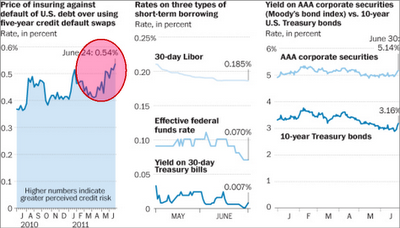May 11 (Bloomberg) -- European stocks fell on concern a $1 trillion lending package, which sent the Stoxx Europe 600 Index to the biggest gain in 17 months yesterday, won’t solve the region’s debt crisis. Asian shares and U.S. index futures slid.
Banco Santander SA, Spain’s biggest lender, sank 4.4 percent as banks led declines in Europe. BHP Billiton Ltd., the world’s largest mining company, retreated 2.2 percent as accelerating Chinese inflation increased pressure for the government to tighten monetary policy. Solarworld AG slid to the lowest level in almost five years after earnings dropped.
The Stoxx 600 slid 1.6 percent to 250.19 at 11:00 a.m. in London. The benchmark gauge for European shares jumped 7.2 percent yesterday after the European Union and International Monetary Fund unveiled a 750 billion-euro ($954 billion) financial assistance package and the European Central Bank said it will purchase government and private debt. The index is still down 8.1 percent from this year’s high on April 15.
“You cannot resolve the debt crisis by issuing more debt or putting up guarantees,” Christian Blaabjerg, the Hellerup, Denmark-based chief equity strategist at Saxo Bank A/S, said in an interview with Bloomberg Television. “Markets will come back and test the will of the ECB/EU on how to deal with this enormous debt.”
Asian, U.S. Stocks
The MSCI Asia Pacific Index sank 1 percent as China’s inflation accelerated, bank lending exceeded estimates and property prices jumped by a record, increasing pressure on the government to raise interest rates and let the currency appreciate. Futures on the Standard & Poor’s 500 Index dropped 1 percent.
The Stoxx 600 retreated 8.8 percent last week, the biggest slump since November 2008, amid concern that a previously announced 110 billion-euro assistance program for Greece would be insufficient to keep Europe’s most indebted nations from defaulting. Greece may have its credit rating lowered to junk within the next month, Moody’s said late yesterday, citing the country’s “dismal” economic prospects.
Marek Belka, the director of the International Monetary Fund’s European department, yesterday said he doesn’t consider the latest European rescue package a “long-term solution.” ECB council member Axel Weber said the bank’s purchase of government bonds poses “significant” risks, Germany’s Boersen-Zeitung reported.
May 11 (Bloomberg) -- Money markets and the cost of protecting bank bonds from losses show investors are concerned the almost $1 trillion rescue plan announced by European leaders may not be enough to contain the region’s sovereign debt crisis.
The Markit iTraxx Financial Index of credit-default swaps on European banks was last at 146 basis points compared with 107 basis points for the Markit iTraxx Europe Index of 125 investment-grade companies, a benchmark it traded an average 10 basis points below for three years, according to CMA DataVision. The three-month Libor-OIS spread, which widens as banks’ willingness to lend decreases, advanced to 19.09 basis points from 18.92 yesterday and 6 basis points on March 15.
The loan package for debt-laden nations including Greece is part of an attempt to stem a decline in the euro, which fell to a 14-month low last week, and stave off a sovereign default that would threaten recovery from the worst global recession since the 1930s. Banks’ potential losses stemming from the crisis are under scrutiny by investors concerned financial institutions are owed too much by Europe’s most-indebted countries.
“Sovereign risk hasn’t gone away in the slightest,” said Jim Reid, head of fundamental strategy in London for Deutsche Bank AG, Germany’s biggest bank. “What this package has done is massively reduced the tail risk in European markets without necessarily changing the medium- to long-term dynamics of financial markets.”
Investor ‘Euphoria’
Elsewhere in credit markets, the extra yield investors demand to own corporate debt instead of government securities fell 8 basis points to 169 basis points, or 1.69 percentage point, after soaring 28 basis points last week, according to Bank of America Merrill Lynch’s Global Broad Market Corporate Index. It peaked at 511 basis points on March 30, 2009, and dropped to as low as 142 on April 21. Average yields fell 0.5 basis point to 4 percent.
The cost of protecting Asia-Pacific bonds from default rose today as investor “euphoria” at the European measures abated, according to Fumihito Gotoh, head of Japan credit research for UBS AG in Tokyo.


